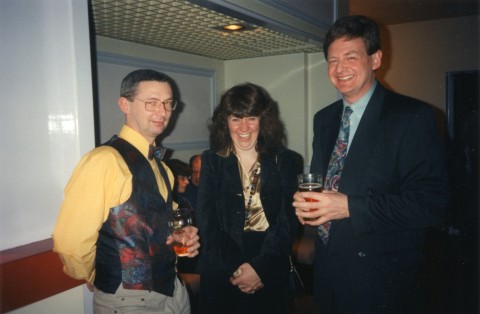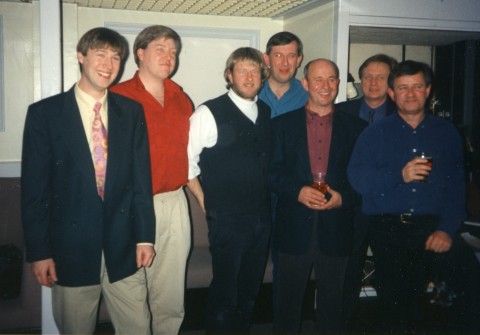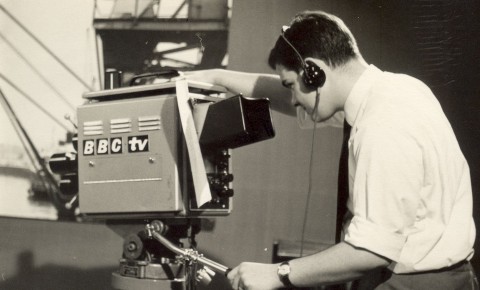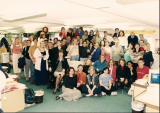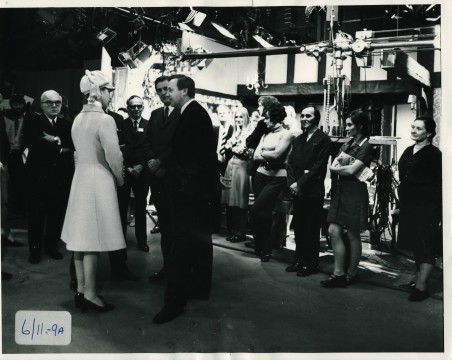
Princess Anne touring the Pebble Mill studios
Copyright of the photo resides with the original holder, no reproduction without permission.
I had a trip down to the BBC Archives at Caversham on Thursday to get more of an insight into the history of Pebble Mill.
If you haven’t been to the BBC Archives, it’s a fascinating experience. You make contact by email, and you are assigned a researcher, who then gets back to you confirming whether or not they have files for you to search through. You then arrange a day when there is a spare desk, and go down to have a look through the files. All the information you’ve requested is on a trolley waiting for you.
The files themselves are pink card folders, carefully catalogued with a reference number and dates. The files I’d asked for were mainly full of memos, often from the Controller of the Midland Region, to other BBC Staff, including the Director General. Each file had been certified by my researcher as suitable for me to look through, i.e. not containing any very sensitive or confidential material. I suspect that the vast majority of the memos hadn’t been read since they were filed away!
One file I came across was all about the Opening Ceremony of Pebble Mill in 1971. There were some fascinating insights into the politics of the occasion. ATV had secured Princess Alexandra to open their Birmingham television centre, and Pebble Mill did not want to be upstaged! There were discussions with the Director General about whether to ask Prince Charles or Princess Anne. It was felt that a Royal from the younger generation was more appropriate for a forward looking broadcasting centre. Princess Anne was agreed upon, and then there was a strategy of how and when to make the approach. Letters flew backwards and forwards to Buckingham Palace, and, after the original date was rearranged to avoid the Princess’s holiday in Scotland, the 10th November 1971 was confirmed.
The timetable and itinerary for the visit were also interesting. The Princess was to arrive at midday in a Wessex helicopter and land at the Police Training Centre across the Pershore Road. A BBC car would then take her over to Pebble Mill, whilst the Royal car carried her Personal Standard. The Personal Standard would be raised up the flagpole on arrival. A bouquet was to be given to the Princess by the eight year old daughter of the Controller of the English Regions, Patrick Beech, following which the Princess would unveil the plaque in the foyer, which read:
“This Broadcasting Centre was opened by Her Royal
Highness the Princess Anne on 10th November, 1971.”
Lunch for 150 guests was to follow at 12.45, after which there was a tour of both the television and radio studios. A highlight of the tour was to be the presentation of a gold-minted Archers’ medallion to commemorate 21 years of the drama! Signing the Visitors’ Book was to end the visit, with Princess Anne’s helicopter departing at 14.50.
I also found a memo about the menu for lunch, the food was to consist of:
Melon with Parma ham,
Steak chasseur,
French beans,
Parmentier potatoes,
Norwegian Cream,
Cheese and coffee.
A rather inferior buffet lunch was available for members of the Press, with a special roast turkey dinner being laid on for staff in the restaurant. Members of staff had to fill out a form, requesting the lunch, and they were then issued with a special ticket.
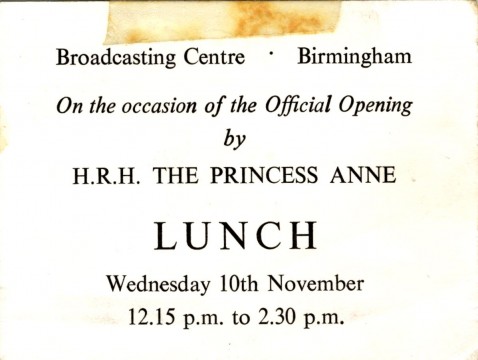
lunch ticket from Gail Herbert
There was also a note about protocol on the day, about how to address the Princess, that she doesn’t smoke, and doesn’t want to be offered cigarettes, and about the fact that she would drink wine only when a toast was involved, and that otherwise she would like a soft drink, preferably Coca Cola! When people were to be presented to her, husbands would go first and shake hands, followed by wives, and ladies must always curtsey!
Vanessa Jackson
The following comments were added on the Pebble Mill Facebook group:
Stuart Gandy: ‘It was great positive time for Birmingham to get this great new broadcasting centre, and it became so well known thanks to PM @1, nationally too. sadly, it’s a very different story today.’
Pete Simpkin: ‘A fascinating piece of research, well done Vanessa. how far away it all seems now when the Mill was all sparkling new and clean and full of enterprising management and teams ready to make the place famous. As Stuart says what a different story for Birmingham today.’
Jean Thomas: ‘Yes I remember the day very well. Remember Prince Charles, Diana, Margaret Thatcher visiting also. John Smith the new Labour leader a lovely man, he passed away not long after his visit. Those occasions will always stand out to me.’
Pete Simpkin: ‘Re the Margaret Thatcher visit I remember ending my shift at about 4pm when she was in the building and being unable to get out of the front doors and guided by Security all the way round to the back followed by men in suits until I exited the North road. Overhead a sombre looking aeroplane was circling round and round on ‘secret security duty’ apparently according to a bobby on patrol.’
Jean Thomas: ‘I didn’t notice the plane. But special branch with their guns in the roof. I was at the front when she came in. You’ve guessed she headed straight for me. Cameras popping all over the place. I just wanted to disappear…’.
